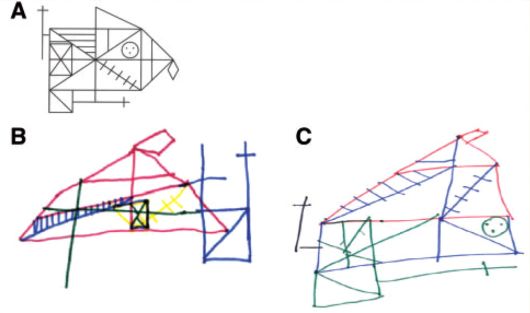
Total Stranger
by SARA BLACK MCCULLOCH
This sentence is full of asides, parenthetical remarks, parentheses, dashes, illuminations, reconsiderations, revisions, addenda, corrections, augmentations, digressions, qualifications, erasures, deletions, and marginal notes. The sentence, in other words, attempts to be exhaustive, to capture every nuance of a piece of reality, and yet to be correct--to reflect Proust's entire thought. To be exhaustive and correct is of course an infinite task. More can always be inserted, more event and more nuance, more commentary on the event, and more nuance within the commentary.
—Lydia Davis, “The Architecture of Thought: Lydia Davis on Proust.”
The world for us is a work in progress. And what we understand of it we understand by cobbling these pieces together—synthesizing them over time.
—Peter Mendelsund, What We See When We Read
Back in December of 2014, Christie’s auctioned off 75 first-edition books, “each a unique object that has been annotated with words and/or illustrations by its author,” as the New York Times put it. The proceeds went to the PEN American Center. Philip Roth, Angela Davis, Lydia Davis, Shirin Neshat, and Toni Morrison (to name a few) revisited their earlier works and filled the blank margins with illustrations, notes on intent, feelings, or small corrections. The PEN American Center’s First Editions/Second Thoughts raised $1 million. Philip Roth’s annotated version of American Pastoral brought in $80,000 alone. One of the annotations that struck me was Alice Walker’s, in The Color Purple. “I was mistaken,” she wrote, “There is nothing more for me to say about this book!” The appeal of the auction was not only to have renowned writers look back on their previous work, but also to make annotating more performative and social. I can’t decide if Walker didn’t want to talk the book or had nothing more to say about it to the public. This isn’t an issue of private or public here, but that she just had nothing to say about it, as if she had moved on already. Marking up a book with your notes already says so much about you.
Annotating a book, we are told, is proof we’ve really engaged with the material, but it’s supposed to be a solitary act, too. It’s the main point of contention for every single e-book detractor: why read a book if we can’t physically do something to it? In 2010, when Sam Anderson was asked by The Millions, to contribute to their “A Year in Reading Series,” he submitted, instead, scans of book pages he had inscribed with personal comments. “Right on the border of stoner existentialism,” he scrawled next to a paragraph of Don Delillo’s Point Omega. “OMG! Rolling EYES so HARD!! Someone needs to protect F’s art from his editorializing,” he penciled in next to a Franzen-esque rant about Twitter in Freedom. (“There was plenty of tweeting on Twitter, but the chirping and fluttering world”—you understand.) Of course, we don’t annotate to jot down our eye rolls or all-caps tirades just as much as we don’t annotate with always an audience in mind.
When Sarah Kessler interviewed a Kindle designer about marginalia, he stressed that Kindle’s version of marginalia was less comparable because it didn’t capture the reader’s state of mind as swiftly—anything from anger to tears on a page. The subject of marginalia is always framed through this e-book lens: publish digitally and marginalia will perish. I enjoy writing in my books, but too often we confound digital publishing as having less of a human touch because of physicality—as if books themselves aren’t written for readers to begin with. The discussions about marginalia are much more morbid as they’re preoccupied with permanence; will this book last long enough for someone else to find it, read it, and remember us?
Ander Monson’s Letter to a Future Lover is a series of lyrical essays that lean on the past in order to hinge on some hope for a future. The one thing that challenges the permanence-ephemerality binary is memory itself. Our memory is imperfect because it constantly encodes information differently; some memories become fuzzier over time while others become more resonant (not without their flaws, of course). Monson considers the relationship between writer and reader and how both are so interdependent on each other: the book relies on a reader so that it has some kind of value (cultural or otherwise), while the reader depends on the book in order to survive (by engaging with it; annotating it). The reader’s notes can survive if the book is still intact. These all become tools for remembering, especially as we begin to forget and misremember things from the past.
+
One of things I remembered most when I played piano was how my teacher would play through a piece, and stop intermittently to scribble notes and highlight changes in tempo, or fingering. She would stop a few times, and repeat sections, testing out different finger combinations. Nearly every note in Bach’s Minuet in G had been assigned a finger number, for instance. She would remind me always, at the top of the page, that left-handed needed to ease up on my left hand, because the melody carried over from right hand to left. The annotations bridged notes to hand movements to the sounds they would create. They were instructions on how to understand something in order to perform it.
Years later, when I was having some problems with memory, I would relentlessly write in the margins of my textbooks. The only way I would realize I had read the material was through notes—my own—peppered all over the page. From the different colors of the pens used, I realized I had read things more than once. My annotations proved I had been there, an active reader, but in the present I drew a blank. When I sat down to read, I wrote all over the page only to forget, a week later, when and where I had penciled in my notes. Taking notes is supposed to help you encode the information in a different way; it’s supposed to help you remember.
+
...the ways in which our lives are reduced to their component parts—blame that less on the ways in which we break and more on the ways in which our social selves are told that we might break. We are not so imaginative as we would hope.
—Ander Monson, Letter to a Future Lover: Marginalia, Errata, Secrets, Inscriptions, and Other Ephemera Found in Libraries.
And so then why are there so few of them [masterpieces]. There are so few of them because mostly people live in identity and memory that is when they think. They know they are they because their little dog knows them, and so they are not an entity but an identity. And being so memory is necessary to make them exist and so they cannot create master-pieces. It has been said of geniuses that they are eternally young.
—Gertrude Stein, What Are Masterpieces?
In his essay “Crime of Omission,” Monson explains how we value product over process — how our livelihoods, reputations, careers, identities, depend on what we make and how we present ourselves. Monson opens the essay with a scanned image of a passage from Steve Orlen’s unpublished manuscript Crime of Omission. It ends with “live in the present.” The undercurrent of the chapter is less about change and vocation; it becomes more about how we hope we’re remembered when we’re gone. We live again through the objects we leave behind, as the objects are triggers for memories too. Monson goes through a garbage bag filled with Orlen’s drafts and unpublished manuscripts. He reflects on writing, how it’s seemingly a solitary act, but also, in a way, something a reader will interact with in the future.
But it’s Monson, now, who has to decide what, in the garbage bag, matters, and he doesn’t know. He finds a pack of Lucky Strikes from 1948 that he eventually keeps as a shrine to Orlen. I wonder how often, when we become the subject of someone else’s memory, how close or distanced we are from it. Do memories make us who we are? Are we the ones who make people remember us a certain way? I wonder how many times we try to dismantle an identity, only to have others impose our own pasts on us in the present. What even makes a book or publication last?
There’s a fascination always, with how we read: psychologists time saccades while art directors invoke the principles of human perception to better layout and display information. There is a question, however, about how people read us; the discordance between how we see ourselves and how others see us. Joe Brainard’s I Remember is defiant, because not only is every memory significant, but it’s specific: it’s a season, a feeling of rejection, a situation:
I remember trying to figure out what it’s all about. (Life.)
I remember the “dum-da-dum-dum-dum” from Dragnet.
I remember looking at myself in a mirror and becoming a total stranger.
I remember when twins dressed alike.
What Monson points to, as he nears the end of the book, is how we seem to remember more significant places and people. What do we miss for the big picture, he asks:
The is the problem with the future, how to use what we think we know right to lever open an idea into understanding, knowing all the while that this is not knowledge but a best-fit line among the scatter plot in view of what we think we know, and not much of one at that.
+
When my memory became a problem, I had to get it evaluated. One of the key neuropsychological tests is the Rey-Osterrieth Complex Figure. You study a drawing with a complex arrangement of lines—some lines connect to make squares or crosses or triangles. The drawing is taken away and after a “short delay” (this evaluates short term and working memory), you are asked to reproduce it. I could barely do so.

After about 20 minutes, you are asked, again, to reproduce the image. I could barely remember what the picture generally looked like. The key to succeeding is chunking the details instead of trying to remember each one; it’s less taxing (it’s how you can remember more). If you can organize your memory and recall the spatial arrangements, the structure, the direction of the lines, then you can remember the image pretty well. Most people do this automatically.
+
Annotating is personal and intimate, but it also gives someone a context to the reader. What does the reader fixate on and why? There’s a constant appeal to withdraw, but to also get inside everyone’s heads. Recently, Rap Genius relaunched as Genius, a website that will attempt to annotate everything from a Kanye song to “The Wasteland.” It’s billed as an “interactive guide to human culture.” Rick Rubin already annotated Kanye’s “Only One”:
Kanye is a combination of careful and spontaneous. He’ll find a theme he likes quickly, and then live with that for a while, not necessarily filling in all the words until later. At the end, he’ll fill in all the gaps.
He was upset at one point when I said that he wrote the lyrics quickly. He’s right — they percolate for a long time, he gets the phrasing into his brain, lives with it, and then lines come up. It definitely starts from this very spontaneous thing.
On "Only One", a lot of those lyrics came out free-form, ad-libs. The song is essentially live, written in the moment. Some of the words were later improved, but most of it was stream of consciousness, just Kanye being in the moment.
It gives us less insight into Rubin, although he admits that Kanye’s cautious spontaneity used to make him anxious; it gives us a bit of context to the making of the song. I wonder if annotating is just another way to remember the reading, to contextualize a small detail in the bigger picture. There are annotations from a small pool of people some would pay for, so I wonder, ultimately, how many of us, just like certain memories we don’t need, are pushed aside for the more important voices.
Sara Black McCulloch is a contributor to This Recording. This is her first appearance in these pages. She is a writer living in Toronto. She has written for The New Inquiry, The Hairpin, Gawker, Bitch, Little Brother Magazine, and The National Post. You can find her website here and her twitter here.

"Desperado" - Rihanna (mp3)
"Love on the Brain" - Rihanna (mp3)

 BOOKS
BOOKS  Tuesday, April 18, 2017 at 11:45AM
Tuesday, April 18, 2017 at 11:45AM 

 It feels so much better to be dissociated from all this, floating through like an upper respiratory infection. I had an idea to do a section on medicine, but I don't want to remind those of you with illnesses of our essential frailty (Sebald). Instead it is better to believe something else the whole time, before realizing the truth at a convenient moment. Isn't this the basic outline of every story you have been told by me?
It feels so much better to be dissociated from all this, floating through like an upper respiratory infection. I had an idea to do a section on medicine, but I don't want to remind those of you with illnesses of our essential frailty (Sebald). Instead it is better to believe something else the whole time, before realizing the truth at a convenient moment. Isn't this the basic outline of every story you have been told by me?
 lydia davis
lydia davis 
































